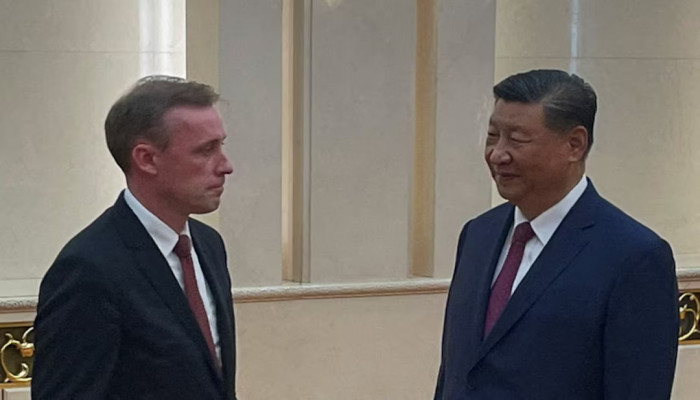NSA Sullivan meets President Xi as wide-ranging China-US talks near end in Beijing
- In Reports
- 11:14 PM, Aug 29, 2024
- Myind Staff
U.S. National Security Adviser Jake Sullivan met with Chinese President Xi Jinping in Beijing on Thursday, concluding three days of discussions aimed at reducing tensions between the two global powers ahead of the U.S. election in November.
During their meeting at the Great Hall of the People, Xi assured Sullivan that Beijing is committed to maintaining a stable relationship with Washington.
"In this changing and turbulent world, countries need solidarity and coordination...not exclusion or regress," Xi said.
Sullivan told Xi that U.S. President Joe Biden was dedicated to managing the relationship to avoid conflict and "looks forward to engaging with you in coming weeks".
Following the meeting, the White House announced that both sides are planning a call between Xi and Biden in the near future.
Over what Sullivan later described as 14 hours of discussions, a wide range of issues straining relations were addressed. These included tensions over Taiwan, the South China Sea, Russia, and U.S. demands for greater Chinese cooperation in curbing the flow of ingredients used to produce fentanyl, which is the leading cause of drug overdoses in the United States.
However, significant gaps remain on certain issues. Sullivan noted that no new agreements were reached regarding the South China Sea, and there was "vigorous give and take" on matters related to economic security and trade.
"We didn't discuss the American election," he added.
More progress was achieved in military relations. Sullivan met with Xi's top military adviser, and both sides agreed that U.S. Indo-Pacific command leaders would soon have a phone conversation with their counterparts in China's southern theatre command, which oversees the country's southern seas.
U.S. military officials have long sought deeper working-level engagement in light of regional disputes and increased deployments across East Asia. A senior U.S. official noted that differences with China over the contested shoals in the South China Sea, which involve the Philippines, a U.S. treaty ally, are likely to be managed rather than resolved "for the foreseeable future."
"If it's not this shoal, it's going to be another feature," the official said.
Before meeting with Xi, Sullivan engaged in a rare discussion with General Zhang Youxia, vice chairman of the Central Military Commission and widely regarded by diplomats as President Xi's key military adviser. Sullivan also held extensive talks with China's top diplomat, Wang Yi, on Tuesday and Wednesday.
During his meeting with Zhang, Sullivan advocated for improved working-level communications between the two countries' militaries. This meeting marked the first encounter between Zhang and an official from the Biden administration.
"Your request for having this meeting with me demonstrates the value the U.S. government puts on military security and our military-to-military relationship," Zhang said as he greeted Sullivan.
Sullivan told Zhang that both countries had a responsibility to prevent competition from veering into conflict or confrontation.
"Given the state of the world and the need for us to responsibly manage U.S.-China relations, I think it's a very important meeting," he said.
The White House stated that Sullivan expressed concerns about China's support for Russia's defence industrial base, as well as issues related to Taiwan and the South China Sea.
Zhang Youxia, who is thought to be close to Xi and has navigated turmoil within China's military ranks, is considered more influential than the defence minister, who meets with foreign officials more regularly, according to Western and Asian diplomats.
In their meeting on Wednesday, Wang and Sullivan explored the possibility of upcoming talks between Biden and Xi. They also exchanged differing views on conflicts in the Middle East and Ukraine, as well as Chinese territorial claims from Taiwan to the South China Sea and trade issues.
"The key to the smooth development of China-U.S. interaction lies in treating each other as equals," Wang told Sullivan, according to state broadcaster CCTV.
The White House said the two held "candid, substantive, and constructive discussions".
In the final months of his presidency before the November 5 election, Biden has emphasised direct diplomacy to influence Xi and manage tensions. U.S. Vice President Kamala Harris, the Democratic candidate, is likely to adopt a similar approach.
However, many analysts who align with former president and current Republican candidate Donald Trump view this strategy as too lenient in response to China's increasingly assertive foreign policy.
Image source: Reuters







Comments